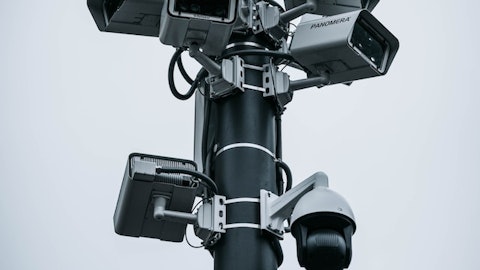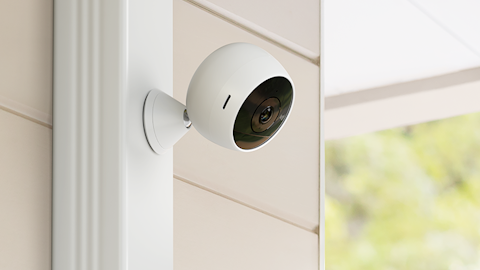So, that’s where it is. We bring a lot of technology to the mechanical locking business, and it’s really paying off, and we expect it to continue to pay off in the future.
Jim Ricchiuti: Got it. And final question, I will jump back in the queue. Kevin, any sense as to where we are in terms of the higher price components that you had in inventory in terms of where we are and burning that off?
Kevin Buchel: We are not buying anything now at the higher pricing. Those days are over. We have to work through some radio inventory because like some of the distributors, we have some extra radio inventory as well. The mixed bag, some of it was priced at higher component costs, some of it at normal component costs. So, that’s why for this past quarter, you saw a gross margin of 28% on hardware, which was great compared to kind of what it’s been. It’s going to get better as the year progresses for two reasons. One, we are going to not have hardly any of the high radio costs in inventory anymore as we go through it. And of course, as the volume picks up and our volumes get stronger as the year progresses, typically, Q2 being better than Q1, Q3 being better than Q2, Q4 being better than Q3 on the hardware side to get that overhead absorption, the margins expand.
So, I am a conservative guy. I was happy to see 28% as we move into the balance of fiscal 2024. My expectation is that these margins will continue to expand even further.
Jim Ricchiuti: Got it. Thank you.
Operator: And our next question comes from Jaeson Schmidt from Lake Street Capital. Please go ahead, Jaeson.
Jaeson Schmidt: Hey guys. Thanks for taking my questions. Just curious if you could provide some color on what you saw from distributor sell-through in the September quarter? And then relatedly, Obviously, you continue to kind of go through this inventory digestion period. When do you think that period is over? Is it largely going to be over in this current quarter?
Kevin Buchel: We have said give it a couple of quarters to work so that the distributors could work through the inventory. This was the first of the two. So, I think we have another quarter to work it through. We are working through the – we are working with our distributors to help them lower their inventory levels on the radios, having this new distributor helps a lot. It’s going to help the stats a lot. They are going to move it, I think at much better paces than the couple of guys that have excess. We were encouraged in the sell-through stats while the sell-through stats on the intrusion guys showed it was lower, our stats were lower than they were a year ago, which we expected because of the radios. We did see it was better than Q4.
So, sequentially it was up. That to me shows starting to move in the right direction. And so we are very encouraged by that. But I would give this – we said two quarters, we just saw one another quarter and we think this second quarter of the two will be better than the one we just did. And then by Q3, for us, it’s more normalized. But whatever it’s going to take, we are going to work with the distributors to move it through. We have been through this before. This is no different. We will put in whatever effort it takes.
Jaeson Schmidt: Okay. That’s helpful. And then just as a follow-up, I know you guys are limited what you can announce in the school security market. But just curious if you could provide an update what you are seeing in that space.
Kevin Buchel: Yes. I wish we could announce more as I hear about. I don’t hear about everyone because sometimes the schools go direct to the distributors and the distributors just sell to the school, to school districts. But I do hear about some, and I am always begging to be able to announce it. And there is usually a reluctance, they don’t, they like to keep things off the radar. Some let us, some don’t. But the school business is still a key part of locking. It’s one of the reasons why the locking sales have grown that infrastructure upgrades in airports, upgrades in hospitals, etcetera, things I mentioned before, they are all key to the locking business, but schools is a part of it. And again, when we could announce it, we will.
We are seeing that the schools are no longer waiting for the kids to be out of school. It used to be that this was somewhat of a seasonal thing. The kids are out of school for the winter break, that’s when the jobs would get done or the kids are out of school in the universities by May, and that’s when the jobs will get done. What’s happening now, we see it all year around schools can’t afford to wait, too much at stake, there is no real seasonality to it. And so we are working hard banging on the doors of all the school districts. There is lots of K-12s out there, and there is over 5,000 universities. And even though we have been talking about this for years, so many, many schools, most, I would say, still don’t have equipment that would prevent tragedies.
So, we always said, they ask me what inning are we in, in the school segment, school security segment. And I say it’s still early innings despite all the things that have gone on.
Jaeson Schmidt: Okay. Appreciate that color. Thanks a lot guys.
Kevin Buchel: Thanks Jaeson.
Operator: And our next question comes from Raj Sharma from B. Riley Securities. Please go ahead Raj.
Raj Sharma: Hi. Thank you for taking my questions and congratulations on the results. The locking device sales are so strong, and they continue to be – can you add some color on where that’s coming from? And should we expect that to continue for the next – the rest of the year?
Richard Soloway: I see that the locking sales are across the board. Institutions, schools, high-rises, hospitals, airport upgrades, it’s everywhere. The Trilogy line, which is our original invention, which has been improved over the years, is the number one locking product, electronic locking product in the business. As I happen to live in Manhattan, I go to LaGuardia Airport upgraded with Trilogies, Kennedy airport, Trilogies. NYU Hospital, Trilogies. department stores, Trilogies. It’s a very, very key product for security in all kinds of buildings. So, we would expect this to continue. We also make it in different versions. We make remote control wireless Trilogies that generate recurring revenue. We make standalone trilogies. We make trilogies for schools. So, we have a very, very wide range of applications for this lock. And we expect the locking business to keep on growing and getting stronger as we add new models to Trilogy and that’s how we see it.
Raj Sharma: Great. Thank you. And then the alarm sales slowdown, we are hearing that, that should reverse in a quarter or two quarters, so this slowdown is due to dealer inventories, not due to end market demand. Is that the correct way to understand that?
Richard Soloway: Very much so, Raj. That’s how we see it. Look at, there is a couple of stats that I pointed out in our prepared remarks, one of which was the run rate. The run rate, we are used to the run rate growing is to grow by about $1 million a month or would be up $3 million for a quarter.
Raj Sharma: That’s a recurring revenue…
Richard Soloway: Recurring revenue run rate. And what we saw last quarter, it went from $63 million to $67 million, it went up by $4 million. That was very encouraging, more than $1 million per month. This quarter, it went from $67 million to $72.5 million, almost $73 million, not quite there, $72.5 million, that’s almost a $2 million a month increase. That run rate is telling you that there is a lot of radios being activated and those radios that are being activated, we are getting paid on them. And those are very good signs. So, that’s why we believe that, that plus our activation stats, that’s why we believe the slowdown that we keep talking about is more of an inventory and distribution issue as opposed to a demand issue.




